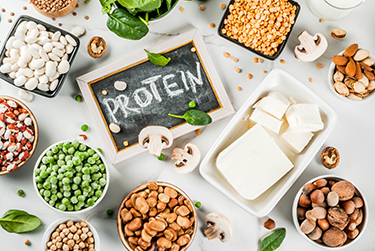
All calories come from four places in our diets: carbohydrates, fat, protein and alcohol. In the 1990s, low-fat diets and foods were everywhere you turned and, more recently, carbs have come under fire. Protein never seems to get much negative attention and is often proudly boasted on many food labels. Some coffee and smoothie shops even offer the option of adding a scoop of protein powder to your favorite drink.
But how much protein do we really need, and is it easy to overdo it? For answers, I turned to registered dietitian and nutrition expert for TOPS Dena McDowell. As a friendly reminder, please always check with your healthcare professional before making any changes to your diet.
Q: Is there such a thing as too much protein and what happens when you have too much?
A: Yes, eating too much protein may have health implications. Typically, a person needs about 15-20 percent of their total calories to come from protein. So, if you consume 2,000 calories a day, this is about 75-100 grams of protein per day. If you are eating 1,500 calories a day, this would be about 56-75 grams a day. To put these ranges into perspective, a cup of milk has eight grams of protein whereas a three-ounce chicken breast has about 20 grams of protein.
You’d have to eat a lot of protein over time to see a negative health impact. Long-term issues of kidney damage and kidney stones may result. Additionally, eating large amounts of protein foods that are animal-based may negatively impact cholesterol levels in the body. Bone health may also be affected.
Q: Protein is often advertised as something to keep your energy levels steady. Is this true?
A: In a general sense, this statement is true. Protein coupled with whole-grain foods can slow the release of carbohydrates (sugar) into the blood stream. This allows the blood sugar levels in the body to be more evenly regulated.
Adding protein to meals and snacks to balance the amount of carbohydrates helps to balance the need to over-produce insulin, thus allowing for a constant small stream of energy.
Q: What are some healthy, minimally-processed and affordable sources of protein?
A: Protein foods may come from animal sources or plant sources. Healthy sources of animal proteins include: lean chicken, turkey, beef, pork, fish, eggs, and low-fat dairy foods such as low-fat milk, yogurt, cheese and cottage cheese. Plant-based proteins include: beans, legumes, nuts, nut butters, and soy foods such as edamame and tofu. You don’t have to buy pricey protein powders or bars to get enough protein in your diet!
Q: In what instances might someone need more protein?
A: In certain conditions, a high-protein diet is recommended. Additional protein is needed when recovering from an illness or trauma, healing wounds, and during treatment for cancer. A high-protein, low-carb diet can be used as part of the treatment for epilepsy and other seizure disorders. Following a high-protein diet should be discussed with your health care provider before making any dietary changes.
Editor’s Note: This post was originally published in October 2016 and has been updated for freshness, accuracy and comprehensiveness.



This is a good page can I get it sent to me
Hi Ethel! Be sure to sign up for blog updates by subscribing on the right side of this page. Thanks for reading!
My husband is diabetic and his doctor advised him to eat more protein (along with a balanced amount of carbs). Your information regarding calories and protein grams was very helpful. Good information! thanks,
Thanks for reading, Beverly!
Totally enjoying your wellness Wednesday
Glad to hear it! 🙂
Great information
Reread this again today. Doing a 21 day fast of all processed foods, meats, seafood, all dairy, sugar and yeast containing foods ( Daniel Fast). This helped by talking about plant based food.
Thank you!